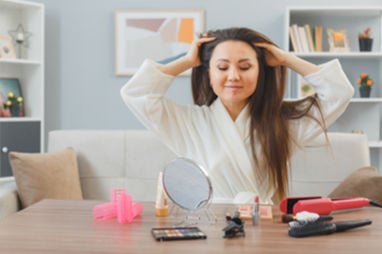Proper scalp moisture is essential for maintaining healthy hair and preventing issues like dandruff, itching, and breakage. A dry scalp can be uncomfortable and lead to more serious hair problems if not addressed. By following a thorough and consistent moisturizing routine, you can keep your scalp healthy and your hair looking its best. This step-by-step guide will walk you through everything you need to know to properly moisturize your scalp.

The first and most important step in any scalp care routine is understanding your scalp type. Different types of scalps require different approaches to care, and knowing your scalp type will help you choose the right products and techniques.
If you’re unsure about your scalp type, observe how your scalp feels throughout the day and after washing your hair. If problems persist, it might be worth consulting a dermatologist or trichologist to get a professional diagnosis and advice.
Using the correct products for your scalp type is vital for effective moisturizing. The wrong products can exacerbate scalp issues, while the right ones can help restore balance and health.
One of the most effective ways to moisturize your scalp is by using natural oils. Oils like coconut oil, jojoba oil, and olive oil have been used for centuries to nourish the scalp and hair. They help improve blood circulation, lock in moisture, and create a protective barrier on the scalp.
Cleansing your scalp regularly is important to remove dirt, excess oil, and product buildup that can clog pores and lead to scalp issues. However, it’s equally important to do this without stripping away your scalp’s natural oils.
Incorporating hydrating treatments into your routine can make a significant difference in maintaining scalp moisture. These treatments can be done weekly or as needed, depending on your scalp’s needs.
Store-Bought Treatments: If DIY isn’t your thing, there are many hydrating scalp treatments available on the market. Look for products that contain natural ingredients like shea butter, argan oil, or hyaluronic acid. Avoid products with alcohol or harsh chemicals, as they can further dry out your scalp.
Your diet plays a crucial role in the health of your scalp and hair. Eating the right foods can help keep your scalp moisturized from the inside out.
Protecting your scalp from external factors that can dry it out is just as important as moisturizing it.
Consistency is key to maintaining a well-moisturized scalp. Establishing a regular hair care routine will help keep your scalp healthy in the long term.
Moisturizing your scalp is essential for maintaining healthy, strong hair. By understanding your scalp type, choosing the right products, and following a consistent care routine, you can keep your scalp hydrated and free from common issues like dandruff and itching. Incorporating natural products like Harish Neelambari Adivasi Herbal Hair Oil can greatly enhance your scalp’s health. This ayurvedic hair oil is crafted from over 48 herbal ingredients, providing deep nourishment and moisture to your scalp, promoting hair growth, and improving overall hair texture. Take care of your scalp, and you’ll see a noticeable difference in your hair’s health and appearance!

Don’t miss our future updates! Get Subscribed Today!
©2024. All Rights Reserved.
Develope and Design by